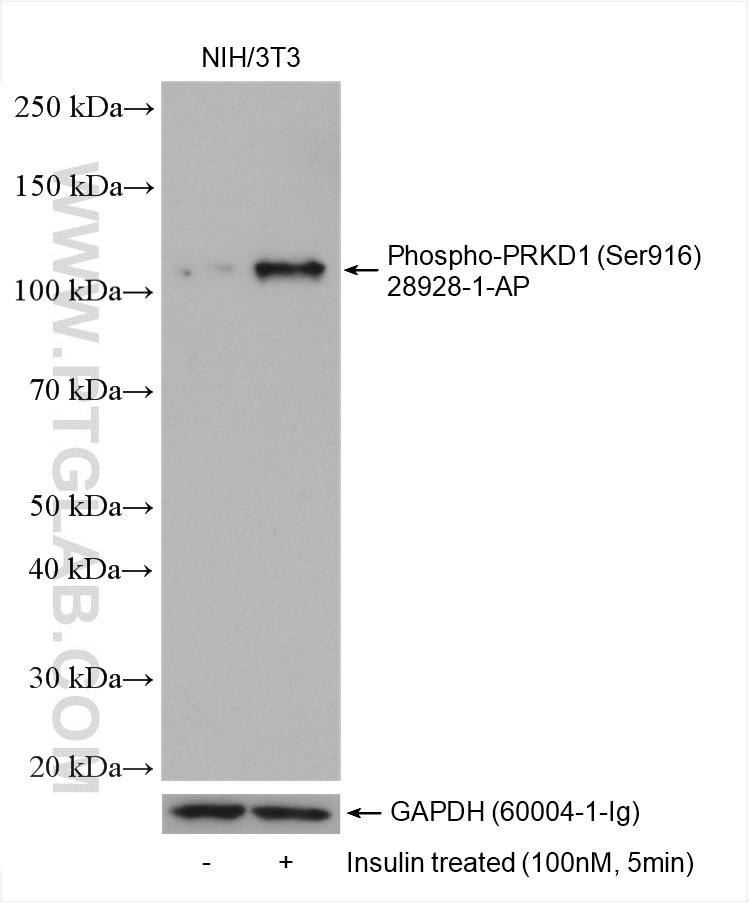Anticorps Polyclonal de lapin anti-Phospho-PRKD1 (Ser916)
Phospho-PRKD1 (Ser916) Polyclonal Antibody for WB, ELISA
Hôte / Isotype
Lapin / IgG
Réactivité testée
Humain, souris et plus (1)
Applications
WB, ELISA
Conjugaison
Non conjugué
N° de cat : 28928-1-AP
Synonymes
Galerie de données de validation
Applications testées
| Résultats positifs en WB | cellules NIH/3T3 traitées à l'insuline, |
Dilution recommandée
| Application | Dilution |
|---|---|
| Western Blot (WB) | WB : 1:500-1:2000 |
| It is recommended that this reagent should be titrated in each testing system to obtain optimal results. | |
| Sample-dependent, check data in validation data gallery | |
Applications publiées
| WB | See 2 publications below |
Informations sur le produit
28928-1-AP cible Phospho-PRKD1 (Ser916) dans les applications de WB, ELISA et montre une réactivité avec des échantillons Humain, souris
| Réactivité | Humain, souris |
| Réactivité citée | rat |
| Hôte / Isotype | Lapin / IgG |
| Clonalité | Polyclonal |
| Type | Anticorps |
| Immunogène | Peptide |
| Nom complet | protein kinase D1 |
| Masse moléculaire calculée | 102 kDa |
| Poids moléculaire observé | 110 kDa |
| Numéro d’acquisition GenBank | NM_001330069 |
| Symbole du gène | PRKD1 |
| Identification du gène (NCBI) | 5587 |
| Conjugaison | Non conjugué |
| Forme | Liquide |
| Méthode de purification | Purification par affinité contre l'antigène |
| Tampon de stockage | PBS with 0.02% sodium azide, 50% glycerol, and 0.05% BSA |
| Conditions de stockage | Stocker à -20°C. Stable pendant un an après l'expédition. L'aliquotage n'est pas nécessaire pour le stockage à -20oC Les 20ul contiennent 0,1% de BSA. |
Informations générales
Protein kinase D1 (PRKD1), also named as PKD1 and PKCμ, is comprised of two cysteine-rich domains and a pleckstrin homology (PH) domain. PKD1 is involved in cellular processes including protein secretion, proliferation, cytoskeletal reorganization, Golgi function, immune function and apoptosis. It is widely expressed in thyroid, brain, heart, lung and other tissues. PKCs have been shown to regulate PKD1 activation. It has been reported that ser 916 is a PKD1 autophosphorylation site. PKD1 can be activated by growth factors, oxidative stress, thrombin, bioactive lipids, cross-linking of B- and T-cell receptors and some G-protein coupled receptors (GPCR). PKD1 is located mainly in the cytoplasm in unstimulated cells, while PKD1 migrates to the membrane in activated cells. (PMID: 17306383, 24806360, 30101477, 21696630)
Protocole
| Product Specific Protocols | |
|---|---|
| WB protocol for Phospho-PRKD1 (Ser916) antibody 28928-1-AP | Download protocol |
| Standard Protocols | |
|---|---|
| Click here to view our Standard Protocols |
Publications
| Species | Application | Title |
|---|---|---|
Food Chem Toxicol G-Rh4 improves pancreatic β-cells dysfunction in vivo and in vitro by increased expression of Nrf2 and its target genes. | ||
Biochem Biophys Res Commun Protein kinase D1 promotes the survival of random-pattern skin flaps in rats |


